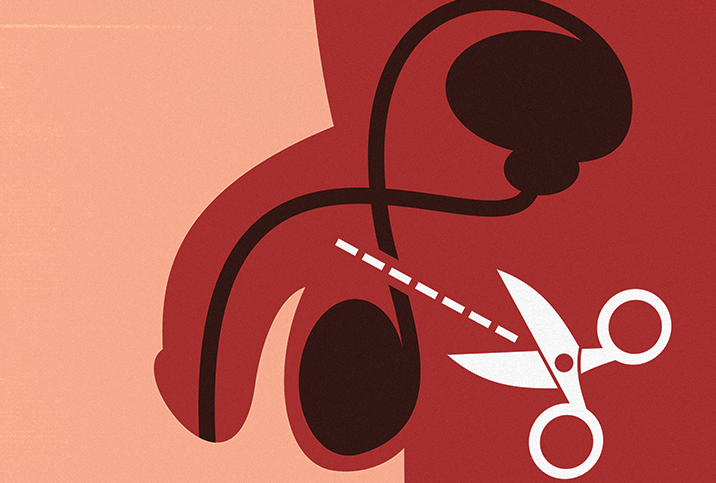Please Stop Believing These ED Self-Treatment Inaccuracies

Do-it-yourself solutions can often bring a sense of pride and accomplishment.
Change your own engine oil. Slick.
Manage your own stock portfolio. Money.
Build your own kitchen cabinets. Solid.
But one area that's not so great for a DIY approach is erectile dysfunction (ED).
The reasons men experience ED are tied to their heart, weight, diet or to chronic conditions they may be unaware of. Simply assuming the cause is a lack of testosterone or energy, for example, can be counterproductive and potentially dangerous.
If you think over-the-counter or as-seen-on-TV supplements will treat your erectile dysfunction, think again. Men's sexual health experts say it's important to know these substances have not been approved by the Food and Drug Administration (FDA) for safety and effectiveness.
Inaccuracy #1
Supplement makers can't make claims in ads that aren't true
Well, that's not exactly accurate. Traditional dietary supplements include ingredients such as vitamins, minerals, herbs, amino acids and enzymes. Whereas supplements advertised as providing sexual enhancement may contain hidden ingredients.
"[Supplements] can have a whole host of different ingredients, which may not be listed on the packaging," said Neel Parekh, M.D., a clinical assistant professor of urology at Cleveland Clinic. "It's obviously a risk to take something like that."
While most supplements are probably unlikely to cause harm, they're also unlikely to have any significant sexual benefit, according to Petar Bajic, M.D., a urologist in the Center for Men's Health in the Glickman Urological & Kidney Institute at Cleveland Clinic.
"There really hasn't been any solid evidence to support supplements in helping with erections," Bajic said. "Companies trying to sell their products are marketing them as a cure, and there's really no research to prove it."
Bajic said men need to exercise caution when buying supplements in the hope of improving their ED symptoms.
"I usually recommend to my patients not to waste money on these supplements when we have effective treatments available that can help them," he said.
Inaccuracy #2
Even if supplements don't help, they're not likely to cause any harm
ED supplements can potentially interact negatively with prescription drugs.
"Could there be some interaction between supplements and prescription medications? Absolutely. Could those be dangerous? Absolutely," Bajic said. "But as far as the details of which ones interact with what, we don't fully know. That's another reason men need to be very cautious when they use these."
Laurence Levine, M.D., a professor of urology at Rush University Medical Center in Chicago, said men need to realize most sexual supplements do very little to enhance their erectile response, unless they happen to be mixed with Viagra (sildenafil), Cialis (tadalafil) or similar drugs used to treat ED.
Those drugs, phosphodiesterase type 5 (PDE5) inhibitors, require a doctor's prescription, yet have been found in many over-the-counter ED supplements even when they aren't listed as ingredients. In fact, the FDA regularly issues warnings about this very occurrence.
Supplements are not approved by the FDA before entering the marketplace, so manufacturers can make whatever claims they want, Levine said. A real danger is possible when a man takes a supplement containing sildenafil while also taking nitroglycerin. These drugs could interact and result in a catastrophic drop in blood pressure, which could potentially result in a stroke, he said.
Inaccuracy #3
Testosterone supplements must be okay—it's not like I'm taking steroids
Over-the-counter testosterone boosters do not do anything to truly boost testosterone, according to Levine.
"Testosterone is actually a metabolite of cholesterol," he said. "Cholesterol is an important agent in terms of production of certain types of hormones, including testosterone and estrogen. But I'm not aware that any of these so-called over-the-counter, over-the-internet boosters will elevate one's testosterone."
Parekh said he often sees young men use testosterone boosters, unaware of the negative effect they can have on their fertility. These supplements can potentially reduce sperm counts in men.
Fertility and semen parameters should be important considerations for men who want to try sexual supplements.
"We know that designer anabolic steroids are sometimes laced into these because these are not FDA-controlled supplements," said Martin N. Kathrins, M.D., an assistant professor of surgery at Harvard Medical School and a urologist at Brigham and Women's Hospital in Boston. "If a man is receiving any androgenic compound, it can really impair semen parameters. It can make it more difficult for a man to conceive. It's mostly reversible, but why would you even expose yourself to it?"
Most sexual supplements are not well-validated and are probably not effective for ED, he said. Men need to look for supplements that have undergone quality, placebo-controlled clinical trials, and doctors need to have a high bar for recommending any supplement, he added.
Inaccuracy #4
Seeking treatment for erectile dysfunction is too embarrassing
It's important for men to see a urologist or men's health specialist about their ED before they consider any supplements or products as self-treatment. Bajic said the challenge often lies in getting through to men that they can talk to a doctor about their erectile difficulties with no judgment involved. Feelings of shame or embarrassment are often the reason men with ED turn to over-the-counter supplements in the first place.
Today, an array of online men's health sites are accessible and discreet. Men don't have to leave their house to get treatment for erectile dysfunction.
Kathrins said he likes that these online-only operations have made men's health care more accessible. He'd like to see more traditional brick-and-mortar academic institutions move toward virtual health care and telemedicine, primarily to remove the stigma and burden and one more barrier for men seeking care for their health issues.
However, Parekh said it's important to know that when you use these services—there are pros and cons to all of them—it's usually not a urologist or specialist who reviews your medical history and treats you. The initial consultation is often fielded by a general practitioner.
"The more prudent, safest way to go about it is to actually see a urologist or a medical specialist," Parekh said. "Get your levels checked, and then you can be started on the appropriate treatment and be closely monitored in the medical setting and covered by insurance, as opposed to trying to do it on your own."


















